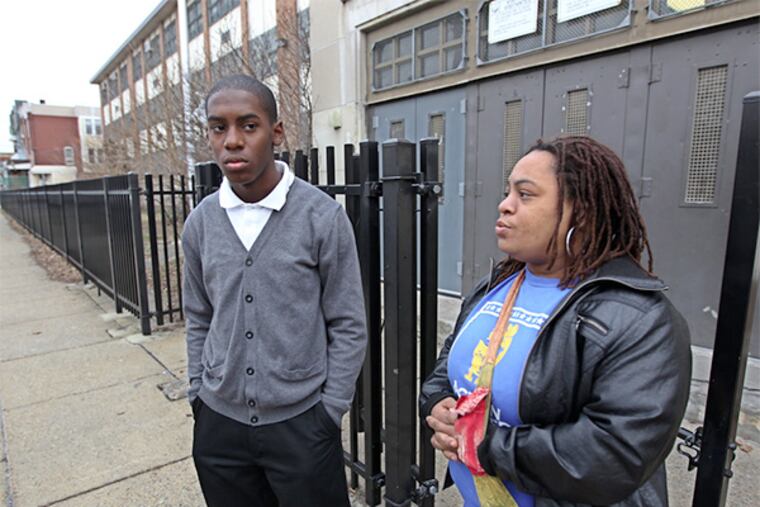New money, new plans for 2 troubled Phila. schools
Khyrie Brown stood outside his school and enumerated the things he was going to tell School Reform Commission Chairman Bill Green on a tour of Blaine Elementary on Monday.

Khyrie Brown stood outside his school and enumerated the things he was going to tell School Reform Commission Chairman Bill Green on a tour of Blaine Elementary on Monday.
The school lacks adequate supplies, said Khyrie, an eighth grader. Its equipment is old, its classes are too big, and it doesn't have enough staff.
"They need to restore what they took from us," said Dawn Hawkins, Khyrie's mother, who also took the tour with Green. She said the school is so underfunded that teachers solicit small change for copier paper, and parents are asked to send in toilet paper and hand soap.
Green had news, though.
Blaine and W.D. Kelley, another public school in North Philadelphia, will use $3 million in grant money from the private Philadelphia School Partnership to transform themselves. Though the grants were made last summer, teachers at both schools were informed last week that they will need to reapply for their positions, with no more than half permitted to remain on the job in September.
"We don't have 10 or 15 years to act," Green said, echoing the mantra he has been emphasizing since he became SRC chairman last month.
"We're going to essentially try to replicate the kind of performance we get in charter-run Renaissance schools," he said, referencing a Philadelphia School District model that gives struggling schools to charter organizations.
But the Blaine-Kelley transformation model is different, and also departs from the existing Promise Academy district turnaround model.
Instead of schools being identified for low performance, Blaine and Kelley were chosen by the district and the well-funded but controversial partnership because they received large numbers of students from schools the district closed in June, and because leaders believe they have strong principals capable of leading turnarounds.
Mark Gleason, executive director of the partnership, said both Blaine and Kelley are developing "robust transformation plans."
"Part of the planning involves ensuring that what gets implemented in the transformation is sustainable on the regular revenues going forward," Gleason said. "Once the start-up money runs out, the school will be able to sustain what it's doing."
Deputy superintendent Paul Kihn said the district was "very excited" about the new turnaround model.
"We believe that we're not going to strengthen our neighborhood schools in a one-size-fits-all kind of way," he said. "We believe we've got to make investments in giving school communities the opportunity to determine, using evidence-based standards and practices, what their transformation model should be."
No new Promise Academies will be designated for the fall, Kihn said, but the 12 current Promise Academies will continue to operate, and more may be created if gains continue at those schools.
But if the Blaine-Kelley model is successful, that model will be expanded regardless of whether the partnership makes further grants, and one or two district schools may be given to charters in September, he said.
At Blaine, which in the fall absorbed 160 students from the closed L.P. Hill School, principal Gianeen Powell said she welcomes the changes.
"I've made some gains, but I can only get us to a certain level. This is an opportunity to take us to the next level," Powell, Blaine's principal for six years, said of the new model.
She and a team of teachers have used the partnership money to tour charter and public schools here and in Chicago, Newark, N.J., and Washington. She liked the local Science Leadership Academy's project-based focus and its emphasis on technology, and said Blaine will have one computer for every two students next year.
"And we want to bring in more science," Powell said. "Over the last few years, we've been focused on math and literacy. But I want children to have the opportunity to create and figure out."
A longer school day is also possible, but not definite, she said.
The staff changes are necessary, she added.
"We want teachers who want to be a part of this vision and mission. We have teachers here who don't think that we should be using technology. They like paper and pencil," she said.
When parents were told about the changes last week, they broke into applause, Powell said.
Hawkins, a member of the group Action United, isn't sold. She and Khyrie upbraided Green at last month's SRC meeting, and wanted him to see for himself that the school is struggling. She said she and Khyrie told Green as much on the tour.
Although glad that Green and SRC member Sylvia Simms toured the school, Hawkins said the answer is not an outside organization swooping in and writing a big check with strings attached.
"I don't want Bill Green going in these schools and thinking everything's OK because of PSP," said Hawkins. "They need to give us full funding."
215-854-5146 @newskag